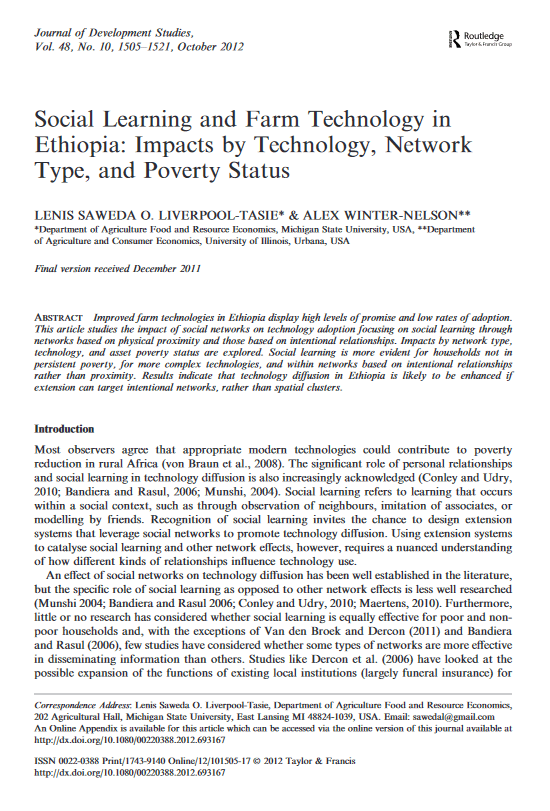︎

Lenis Saweda
Michigan State University, Department of Agricultural, Food, and Resource Economics
Saweda Liverpool-Tasie is a tenured associate professor in the department of Agricultural, Food, and Resource Economics. She received her PhD in Agriculture and Consumer Economics from the University of Illinois, Urbana-Champaign. She holds an MSc in Urban and Regional Planning and an MA in Third World Development, both from the University of Iowa. She also holds a BSc. (Honors) in Economics from the University of Jos, Nigeria. Her current research focuses on emergent issues related to smallholder productivity and welfare within dynamic and transforming food markets in sub Saharan Africa and alongside poorly functioning markets in the region. Furthermore, she has a keen interest in understanding input use and input markets as well as evaluating input policies.
MORE ABOUT LENIS SAWEDA >Feb 27, 2024
Thomas Reardon, Lenis Saweda O Liverpool-Tasie, Bart Minten
Quiet Revolution by SMEs in the midstream of value chains in developing regions: wholesale markets, wholesalers, logistics, and processing
Small and medium enterprises (SMEs) in the midstream (processors, wholesalers and wholesale markets, and logistics) segments of transforming value chains have proliferated rapidly over the past several decades in Africa, Asia, and Latin America. Their spread has been most rapid in the long transitio...
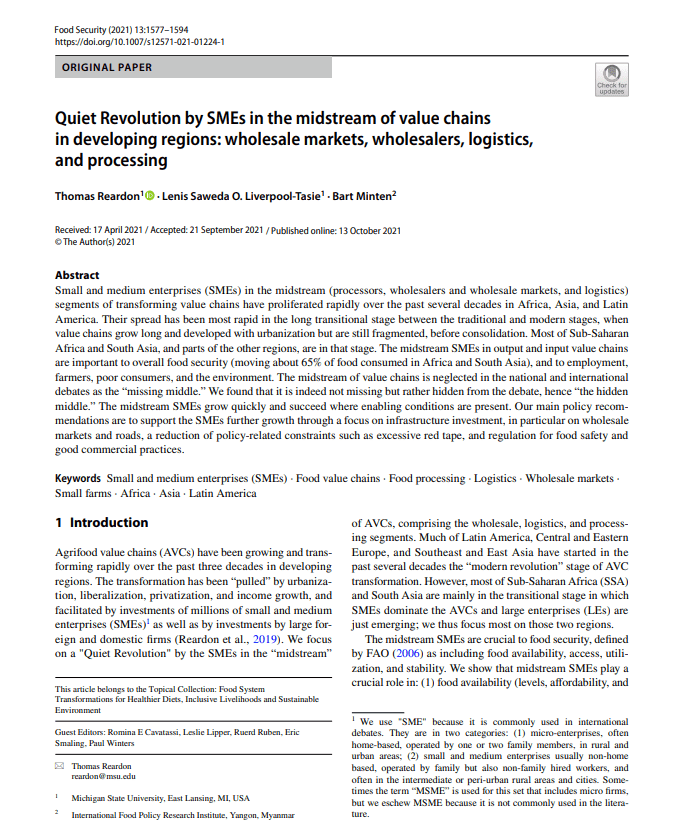
Jan 1, 2020
Lenis Saweda O. Liverpool-Tasie, Ayala Wineman, Sarah Young, Justice Tambo, Carolina Vargas, Thomas Reardon, Guigonan Serge Adjognon, Jaron Porciello, Nasra Gathoni, Livia Bizikova, Alessandra Galiè & Ashley Celestin
A scoping review of market links between value chain actors and small-scale producers in developing regions
Sustainable Development Goal 2 aims to end hunger, achieve food and nutrition security and promote sustainable agriculture by 2030. This requires that small-scale producers be included in, and benefit from, the rapid growth and transformation under way in food systems. Small-scale producers interact...
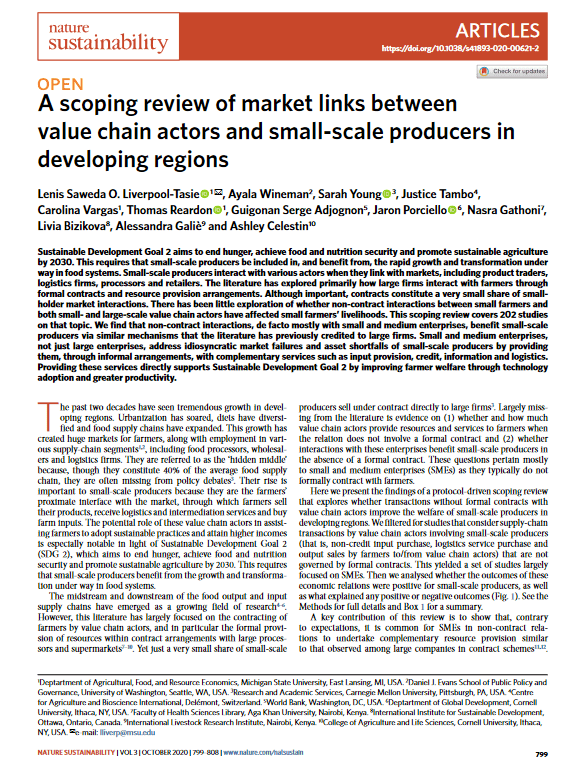
Jan 1, 2020
Michael Dolislager, Thomas Reardon, Aslihan Arslan, Louise Fox, Saweda Liverpool-Tasie, Christine Sauer, David L. Tschirley
Youth and Adult Agrifood System Employment in Developing Regions: Rural (Peri-urban to Hinterland) vs. Urban
Using a unique dataset covering 178,794 households with 460,654 individuals spanning Africa, Asia, and Latin America, we explore employment of youths across rural zones (peri-urban, intermediate, hinterland) and urban areas. Using full-time equivalents (FTEs), we compare own-farming versus farm-wage...
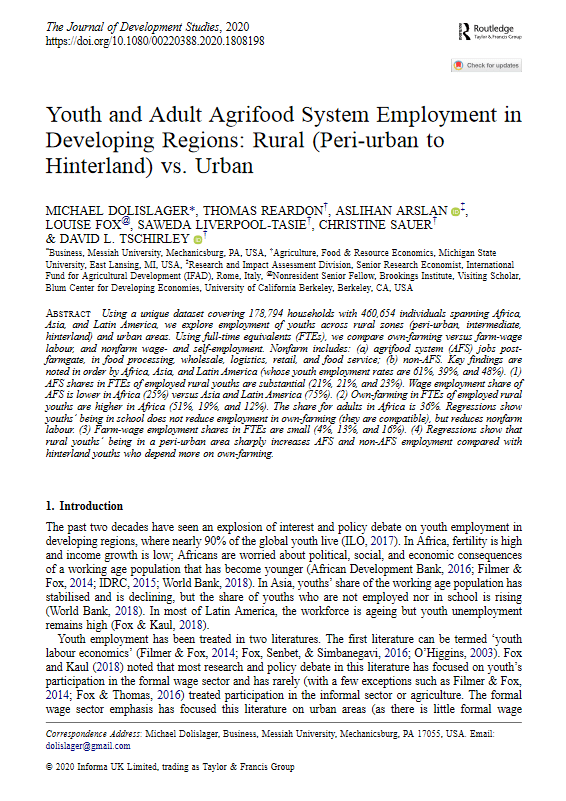
Jan 1, 2019
Thomas Reardon, Ruben Echeverria, Julio Berdegué, Bart Minten, Saweda Liverpool-Tasie, David Tschirley, David Zilberman
Rapid transformation of food systems in developing regions: Highlighting the role of agricultural research & innovations
Developing regions' food system has transformed rapidly in the past several decades. The food system is the dendritic cluster of R&D value chains, and the value chains linking input suppliers to farmers, and farmers upstream to wholesalers and processors midstream, to retailers then consume...
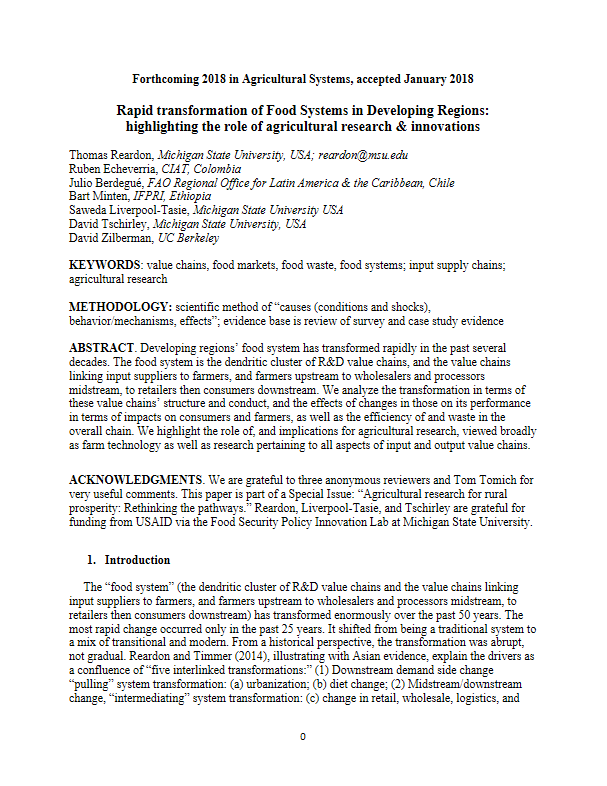
Jan 1, 2012
Lenis Saweda O. Liverpool-Tasie, Alex Winter-Nelson
Social Learning and Farm Technology in Ethiopia: Impacts by Technology, Network Type, and Poverty Status
Improved farm technologies in Ethiopia display high levels of promise and low rates of adoption. This article studies the impact of social networks on technology adoption focusing on social learning through networks based on physical proximity and those based on intentional relationships. Impacts by...
